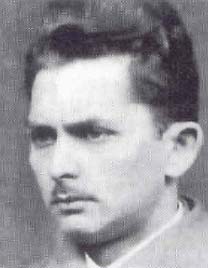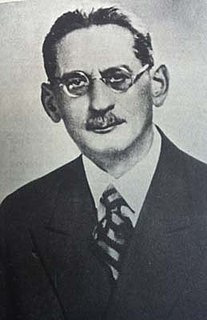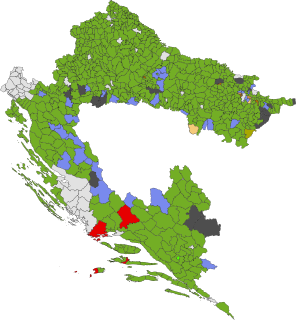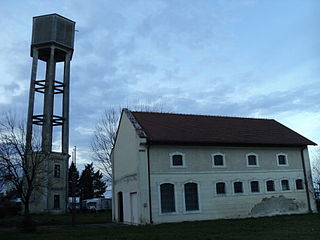
Eugen Dido Kvaternik was a Croatian Ustaše General-Lieutenant and the Chief of the Internal Security Service in the Independent State of Croatia, a Nazi puppet state during World War II.
Parliamentary elections were held in the Kingdom of Croatia-Slavonia from 19 to 22 May 1897. The People's Party emerged as the victor.

Ivo Goldstein is a historian, author and ambassador from Croatia. Goldstein is a recipient of the Order of Danica Hrvatska (2007) and the City of Zagreb Award (2005).

The Holocaust in the Independent State of Croatia is a term which is primarily used in reference to the genocide of Jews, but sometimes, it is also used in reference to the genocide of Serbs and Romani (Porajmos), within the Independent State of Croatia, a fascist puppet state which existed during World War II, was led by the Ustaše regime, and ruled an occupied area of Yugoslavia which included most of the territory of modern-day Croatia, the whole of modern-day Bosnia and Herzegovina and the eastern part of Syrmia (Serbia). Of the 39,000 Jews who lived in the NDH in 1941, the United States Holocaust Memorial Museum states that more than 30,000 were killed. Of these, 6,200 were shipped to Nazi Germany and the rest of them were killed in the ISC, the vast majority were killed in Ustaše-run concentration camps, such as Jasenovac. The Ustaše were the only quisling forces in Europe who operated their own extermination camps for the purpose of killing Jews and members of other ethnic groups.

Slavko Goldstein was a Croatian historian, politician, and writer.

Miroslav Šalom Freiberger was a Croatian chief rabbi, translator, writer and spiritual leader. He was educated as a lawyer and doctor of theology.

Slavko Brill was a Croatian Jewish sculptor and ceramics artist born in Nova Gradiška.

Samuel "Sami" David Alexander was a Croatian Jewish industrialist, doyen of Croatian industrialists, a philanthropist and a member of the Zagreb prominent Alexander family.
Zora Dirnbach was a Croatian Jewish journalist and writer, born in Osijek on 22 August 1929 to a Jewish father and Austrian-born Catholic mother who converted to Judaism in 1922. She was raised with her sister Gertruda.

Hinko Hinković was Croatian lawyer, publisher and politician.

Dr. Slavko Wolf was a Croatian lawyer, chess player and writer.

Vlado Singer was a Kingdom of Yugoslavia politician and a prominent member of the Croatian Ustaše movement.

Aleksandar Savić was a Croatian communist activist and member of the partisan resistance movement in Croatia, murdered during the Holocaust in the Independent State of Croatia.

Dr. Aleksandar Licht (1884−1948) was a Croatian Zionist leader and founder of the Zionist movement in Croatia.

The 1940 Croatian local elections were held in 625 municipalities of the Banovina of Croatia on 19 May 1940, and in 33 municipalities on 26 May and 2 June. These were the first elections following the Cvetković–Maček Agreement and the establishment of the autonomous Croatian Banate within the Kingdom of Yugoslavia. The elections were not held in cities and some Adriatic counties bordering, or adjacent to, Italy. Only men older than 24 were allowed to vote. Voting was public and conducted by voice.

Danica was the first concentration and extermination camp established in the Independent State of Croatia during World War II. It was established in Koprivnica on 15 or 20 April 1941 in the deserted building of former fertilizer factory "Danica". Mijo Babić participated in preparations for the establishment of Danica concentration camp The first individual inmates were brought to Danica on 18 April 1941 while first groups arrived at the end of April 1941.

The 5 December 1918 protest in Zagreb, also referred to as the December Victims in Croatia was an armed clash fought by the National Guards established as an armed force of the National Council of the State of Slovenes, Croats and Serbs supported by Sokol volunteers, on one side, against the soldiers of the 25th Regiment of the Royal Croatian Home Guard and the 53rd Regiment of the former Austro-Hungarian Common Army. It took place on 5 December 1918, four days after proclamation the Kingdom of Serbs, Croats and Slovenes, when the soldiers were stopped by the National Guardsmen at the Ban Jelačić Square in Zagreb.
Vitomir Korać was a politician born in Šid. In 1896, Korać became a member of the main committee of the Social Democratic Party of Croatia and Slavonia. He advocated cooperation of the social democrats with bourgeoisie parties as a means of political struggle against policies of the Ban of Croatia Károly Khuen-Héderváry. In 1905, he became a member of the Croat-Serb Coalition led by Frano Supilo and Svetozar Pribičević. Korać was elected a member of the Sabor of the Kingdom of Croatia-Slavonia in the term of 1908–1910. In 1918, Korać became a member of the National Council of Slovenes, Croats and Serbs – a body composed of political representatives of the South Slavs living in Austria-Hungary tasked with achieving independence of South Slavic lands from the empire. In November 1918, Korać gained prominence as the person who uncovered and reported an alleged planned coup d'état by General of the Infantry Anton Lipošćak in what became known as the Lipošćak affair. Korać was appointed the Social Policy Minister in the Government of the just established Kingdom of Serbs, Croats and Slovenes in 1918–1920. While advocating socialist policies, Korać opposed Bolshevism. He participated in establishment of the Socialist Party of Yugoslavia in Belgrade in 1921. In 1920s, Korać withdrew from politics and published the Povijest radničkog pokreta u Hrvatskoj i Slavoniji od prvih početaka do ukidanja ovih pokrajina 1922. godine in three volumes in 1929–1933. He died at Iriški Venac.
Lav Mazzura was a politician and lawyer born in Zagreb. After studying law in Zagreb and Prague, he became one of leaders of the Croatian Progressive Youth. He was the editor of the Hrvatski pokret and the Hrvatska misao journals. In 1910–1913, Mazzura was a member of the Sabor of the Kingdom of Croatia-Slavonia as a member of the Croat-Serb Coalition led by Frano Supilo and Svetozar Pribičević. He was also a member of the joint Hungarian-Croatian Parliament in Budapest. In November–December 1918, Mazzura was in command of Zagreb-based forces assigned to the Commission for Public Order and Security of the National Council of Slovenes, Croats and Serbs – a body composed of political representatives of the South Slavs living in Austria-Hungary tasked with achieving independence of South Slavic lands from the empire. According to testimony of Slavko Kvaternik, Mazzura was involved in unsuccessful negotiations to peacefully resolve a standoff during the 1918 protest in Zagreb. In 1919, Mazzura was appointed to the post of the prosecutor for the city of Zagreb. He died in Zagreb in 1930.















